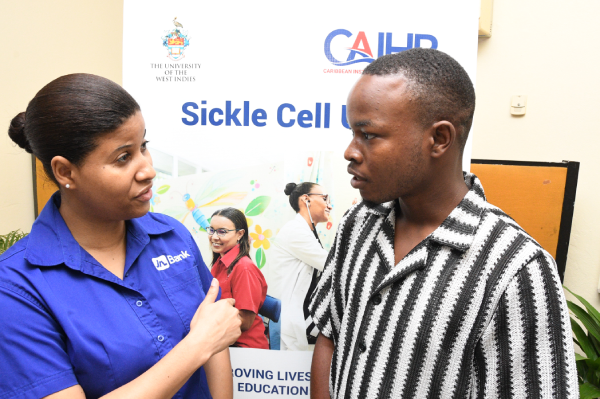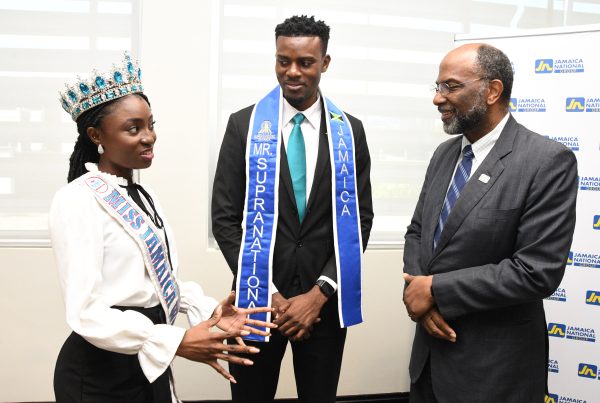Tassea Edwards was eight-years-old when she started learning sign language, after her adult cousin, who is deaf, came to live with her family. At the time, no member of her household was able to communicate in sign language.
Acting on her cousin’s visual cues and body language, Tassea quickly developed competency in sign language. Little did she know that years later, she would be using this skill to make a huge difference for several deaf and hard-of-hearing persons.
For the past two years, Tassea, a Customer Service Representative with Beryllium Limited, the finance and technology outsourcing arm of the Guardsman Group, and who is on assignment at the JN Bank Half-Way-Tree branch, has been making the banking experience convenient for deaf members and customers conducting their transactions.
“I serve up to five customers per week. A friend tell a friend and a friend tell a friend,” said Tassea, explaining how the number of deaf persons she serves is gradually increasing.
The Bridgeport High alumna related that she started to bridge the communication gap with customers after she observed a customer service representative in the branch trying to communicate with a deaf person.
“They had to be writing back and forth. I was passing so I stopped. The customer was signing to her friend, and the friend was signing back so I started to translate for the staff. I made it easier for them because the back and forth writing would have been time consuming.”
Tassea pointed out that although persons who are deaf communicate in writing during transactions, written communication sometimes poses a challenge for some employees.
“They don’t write in complete sentences,” she said, explaining that persons who are deaf often write using only key words in written conversations.
Although Tassea is au fait with sign language, she further highlighted that persons in different parts of the island sometimes use different signs for different words, which sometimes poses a communication challenge.
Apart from using sign language on the job, Tassea also ministers to both hearing and deaf congregants at the Power of Faith Ministries, where she is a member of the sign language choir.
Prior to serving in JN Bank Tassea was a security officer with Marksman, another company within the Guardsman Group, for six years and was based at the Norman Manley International Airport in Kingston. When she was invited by Beryllium Limited to be part of the company’s first cohort of customer service representatives, she gladly seized the opportunity as it was her childhood dream to work in this area.
“I always go to my mother’s office after school. I always wanted to work in an office,” she said adding that as a people-person, she has the knack for customer service.
Sanya Hamilton-Blake, Manager, Customer Experience And Service Recovery, JN Bank, is pleased with how Tassea is using her sign language skill to enhance customer service delivery.
“It is commendable that Tassea has taken on this initiative to help communicate with some of our customers as this is in keeping with the customer experience we strive for, which promotes inclusion of persons with disabilities.”
She underscored that JN Bank places emphasis on meeting the needs of members and customers, especially those with disabilities.
“We strive to be accommodating to persons who are deaf or have speech impediments. Our Smart ATMs have instructions in Braille to help the visually impaired, and most of our buildings have ramps and bathrooms that are accessible to the persons who are wheelchair bound. Currently, we are in the process of retrofitting our other locations, including our third party-owned buildings, to ensure ease of access to all persons,” she pointed out.
Kimberley Sherlock Marriott-Blake, Executive Director of the Jamaica Association for the Deaf, advised that the deaf community can be better served by being intentional about making business processes more accessible.
“When we make things more accessible for persons with disabilities, it is also more accessible for the general public,” she maintained.
She pointed out that the anticipated communication barrier for the deaf is often the reason for members of the community being hesitant about conducting business.
“They want to engage with service providers, but they feel that they are going to have a terrible time, [so] they just don’t bother. When they know that there’s a particular space [where] they can get support, there is a readiness to engage in a different way,” she said, adding that organisations can accommodate the deaf when they are doing business by presenting information in a visible manner.
Mrs Sherlock Marriott-Blake estimates that there are about 60,000 deaf persons in Jamaica, not including elderly persons who have lost their hearing.





